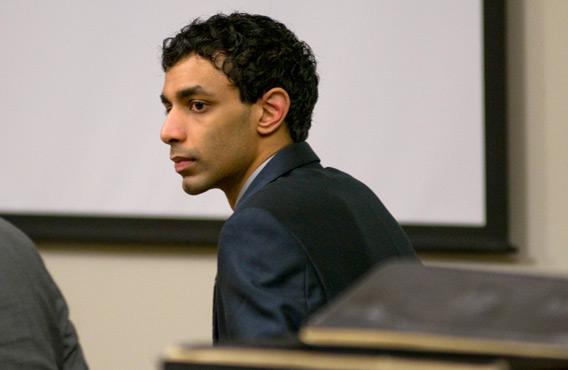We’ve reached the end of the trial of Dharun Ravi, the Rutgers student facing criminal charges for using a webcam to spy on his former roommate, Tyler Clementi. And we’re no closer to understanding either of these young men.
It’s not surprising that the trial hasn’t shed any light on Clementi, who took his own life in September 2010 by jumping off the George Washington Bridge. The suicide note he left behind, along with three Word documents with telltale names—Gah.docx, sorry.docx, and Why is everything so painful.docx—haven’t been turned over to the defense or made public. (They’re not directly relevant to the case against Ravi.) Without the clues that may be in those files, the trial couldn’t hope to explain Clementi’s death.
Instead, the testimony has hammered home the facts already apparent from a ream of electronic records: On the Sunday before Clementi died, Ravi saw a man he didn’t know go into the room they shared, turned on his webcam, and watched for a few seconds while Clementi and the other man kissed. Two days later, when Clementi asked to use the room again, Ravi made giddy plans to turn the webcam back on, tweeting “Yes, it’s happening again,” daring his Twitter followers to video chat him at the appointed hour so they could watch the webcam feed, and texting to a friend about the upcoming “viewing party.” This spying episode didn’t come off, because Clementi turned off the power strip for Ravi’s computer, according to the Rutgers IT department. But two students testified that Ravi set up the webcam and made sure it was pointing toward Clementi’s bed. All of this is the basis of the invasion of privacy charge Ravi is facing.
The testimony also established that after Clementi complained to the dorm’s resident adviser about the spying—which he knew about because he too was following Ravi on Twitter—Ravi deleted or altered his incriminating tweets. That is the basis for another charge of evidence tampering.
What we don’t know is why Ravi acted so badly. In the prosecution’s version of the story, he is a criminal gay-basher. In the defense’s version, he is stupid and immature, a newbie freshman reacting to the “shocking experience” of his gay roommate’s hook-up with a “scruffy and homeless-looking and suspicious-looking” date. Not helpful for the defense was the testimony of M.B., the man in question, who was calm, clean cut, and entirely unsuspicious seeming on the stand (though at 30, M.B. was significantly older than Ravi and his friends). Ravi’s friends testified that he didn’t regularly make homophobic statements, but one student said he seemed “uncomfortable” about gay people, and before M.B.’s return trip to the dorm, Ravi texted about wanting to “keep the gays away.”
In this case, an awful lot is hanging on the perceived attitude of an 18-year-old. The most serious charge Ravi faces—“intimidation bias,” which carries a penalty of up to 10 years—will turn on whether the jury thinks he deliberately tried to intimidate and humiliate Clementi because he was gay. It’s for this reason that I found myself asking a question that usually makes defense lawyers roll their eyes: Should Ravi have testified on his own behalf?
The standard answer is no, as Mark Di Ionno, a columnist for the New Jersey Star-Ledger, laid out this week. The obvious problem with putting Ravi on the stand is that he would have had to explain his own tweets, which might have forced him to admit to the evidence tampering charge. He also would have surely been asked on cross-examination about his statement to the police that, reflecting on his own actions, he could see that he’d violated Clementi’s privacy.
But it’s precisely because of Ravi’s tweets and his police interview that I wonder if this is the rare case when a partly guilty-seeming defendant is better off speaking up on his own behalf. I wish Ravi had taken the plea deal of zero prison time that was offered him before trial. But he didn’t, and it seems to me that in all likelihood, Ravi’s best chance after four weeks of testimony is that the jury just won’t have the heart to find him guilty and send him away. With his baby face and his previously unblemished record, Ravi doesn’t look the part of a bad guy.
If I was on that jury, though, I’d want to know what he has to say for himself all these months later. How should we think about the spying from his point of view? Ravi has said he was concerned about M.B.’s scruffy appearance because he’d left his iPad in his room. Maybe, but it’s pretty unconvincing that’s the entire explanation. He was clearly both freaked out and titillated by the idea that gay sex was going on in his bedroom. And if that’s an understandable reaction from an 18-year-old, I’d like to hear Ravi parse out why in his own words.
Often the decision about whether a defendant should testify is cast in terms of the strength of the prosecution’s case. The thinking is that if the government has not met its burden, then there’s no reason to take the risk of putting the defendant at the mercy of cross-examination. In this case, that is a big if. I’m left with the sinking feeling that Ravi’s behavior was both stupid and criminal, at least with regard to the lesser charges. Does he deserve to go to prison, or to be deported if he’s convicted, since he was born in India and isn’t an American citizen? I still don’t think so. But I’m not sure he gave the jury enough reason to spare him.
